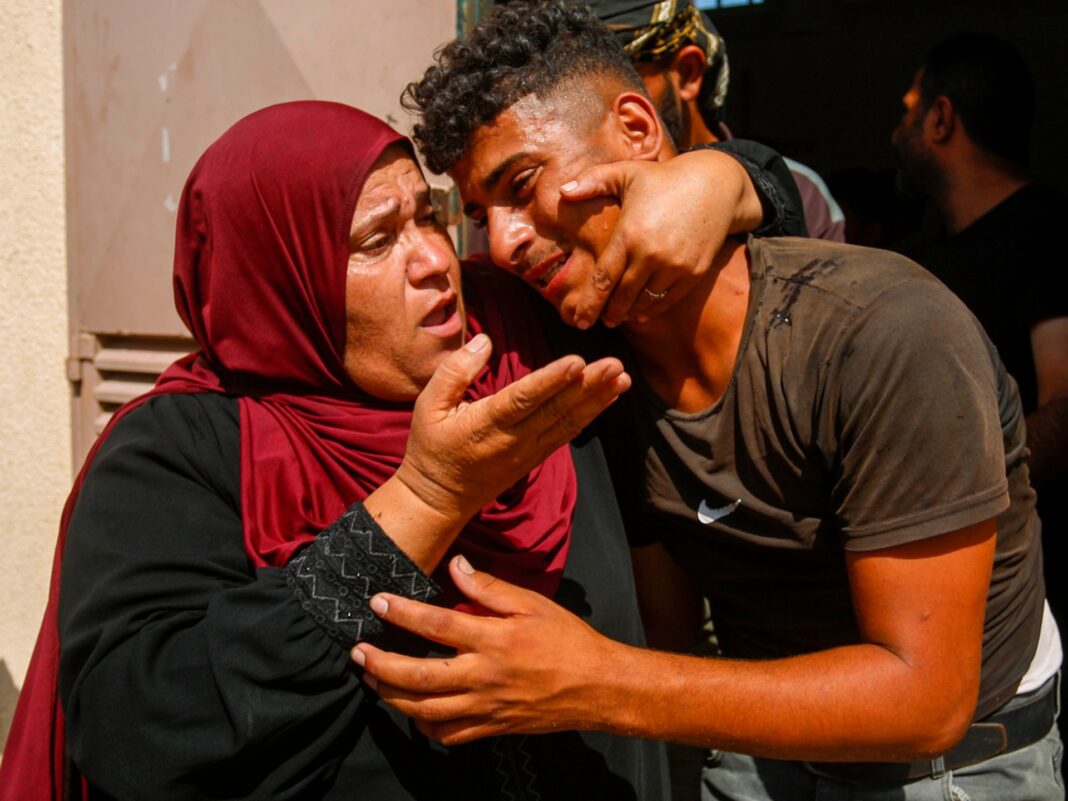Israeli bombardment of Gaza killed dozens of people as it intensified its attacks on the besieged territory amid a worsening humanitarian crisis.
The Gaza health ministry said the bodies of 30 people killed in Israeli raids arrived at al-Ahli Arab Hospital in Gaza City on Friday in what it described as a “difficult and brutal day”.
At least 25 people were also killed and 50 others wounded in Israeli attacks on tents for displaced Palestinians in al-Mawasi, near Rafah, in the south of the coastal enclave, it said.
In a separate incident, the Palestinian Civil Defence agency said crews transported a number of people killed and injured in Israeli shelling of al-Shakoush area, northwest of Rafah.
Israeli forces bombed the garage of the Gaza City municipality as well as a five-storey building in the city, Al Jazeera Arabic correspondent Ismail al-Ghoul reported.
The health ministry said earlier Israel’s military killed at least 35 Palestinians over the previous 24 hours, bringing the death toll from the invasion to 37,431 since October 2023.
Meanwhile, the humanitarian situation continued to deteriorate as a result of the Israeli blockade on the territory, which has brought Gaza to the verge of famine.
The medical relief group Doctors Without Borders, known by its French initials, MSF, said on Friday that it may have to suspend its operations in Gaza because of dwindling healthcare supplies.
“MSF is facing critical shortages of essential medicines and equipment as it has been unable to bring any medical supplies into Gaza since the end of April,” the group said in a statement.
It explicitly blamed Israel for the situation, including its seizure and closure of the Rafah crossing last month. The gateway between Gaza and Egypt served as a major artery for the entry of humanitarian assistance and aid workers.
“The closure of the Rafah crossing following Israel’s offensive in the south of Gaza in early May, coupled with the endless red tape imposed by Israeli authorities, has led to a dramatically slow flow of humanitarian aid through the crossing that is open, Kerem Shalom [Karem Abu Salem] entry point,” MSF said.
“This has led to massive queues of trucks and perilous delays in the delivery of humanitarian assistance across Gaza.”
‘Intentional attack on civilians’
Israeli attacks have killed more than 270 humanitarian workers in Gaza since the start of the war in October, making the delivery of aid that does reach Gaza increasingly difficult.
Israel launched its assault on Rafah early in May despite international warnings, displacing hundreds of thousands of Palestinians – many of whom already fled other parts of Gaza.
But the United States, which sternly cautioned Israel against invading the southernmost Gaza city, has insisted the Israeli assault is not a “major” offensive.
Friday’s deadly attacks come two days after a United Nations-backed commission concluded Israel’s “deliberate” use of heavy weapons in Gaza constitutes an “intentional and direct attack on the civilian population”.
Israel’s bombardment has levelled entire neighbourhoods across Gaza, but Israeli Prime Minister Benjamin Netanyahu has rejected accusations of targeting civilians.
“In terms of trying to avoid civilian casualties … the Israeli army has gone to lengths that no other army in history has gone to,” he told US publication Punchbowl News on Friday.
The interview was criticised by several international journalists for its “softball” questions.
Palestinian armed groups remain active in Gaza, and Israel has only managed to rescue a handful of captives taken by Hamas during the October 7 attack, which killed more than 1,100 Israelis.
Early on Friday, the Israeli military announced the killing of two of its soldiers, and the armed wings of Hamas and Palestinian Islamic Jihad claimed several attacks against Israeli forces later in the day.
Netanyahu said Israel is seeking the “sustained demilitarisation” of Gaza, which would be followed by establishing a civil administration “with the cooperation of an inter-Arab sponsorship and assistance by Arab countries”.
“And then the third thing would be obviously some kind of deradicalization process that would begin in the schools and the mosques to teach these people a different future than the one of annihilating Israel and killing every Jew on the planet,” he told Punchbowl News.
“And the fourth, it would be reconstruction, which would be largely taken, I think, by the international community.”







